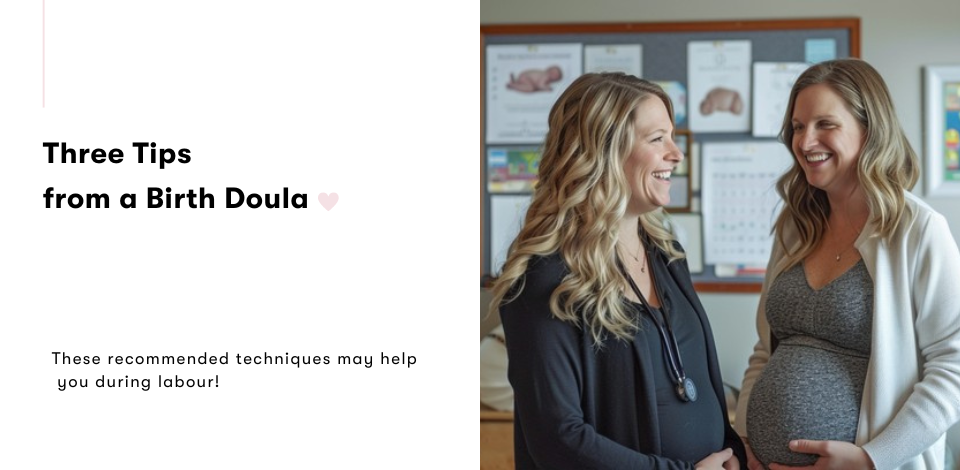Three Tips from a Birth Doula
Aller à la section

For many mothers-to-be, the thought of labour can seem scary and intimidating. However, with the right knowledge and help, you will feel much more prepared when the big day comes.
To set you off on your journey, we are sharing three Doula-recommended techniques that may help you during labour!
Let’s get to it!
Breath
Breathwork is so useful; imagining yourself breathing baby down is such a lovely visual during labour. Everything happening in your body is happening with one goal: to bring your baby closer to meeting you! Your body will have natural positions that allow you to breathe in a good natural rhythm; all you have to do is find them!
Some people find a modified Child's pose provides their body with a rest — allowing them to breathe without intentionally focusing on it. To experience the relief of this position during labour, have your birth partner or Doula support you in Child's pose, this can be done on a big blue exercise ball.
Controlled breathing can also help you when you get caught in a surge or contraction! When this feeling happens, remain calm and breathe long and slowly. Pick something in the room to focus on and breathe to it. Lock your eyes on anything that makes you feel good and simply breathe. This is not as easy as it sounds!
Recovering your breath and making sounds can help bring your baby closer to you. It’s primal! Sometimes, labour is very quiet, and the only sounds you hear are breathing. The right birthing pose will help you catch your breath and can even encourage the baby to come on down!
Mantra
Using the mantra of “you can do anything for 60 seconds” can be helpful. Remind yourself discomfort comes in waves, and you can handle those waves if you break them down into short intervals. Truly, test it out; you can usually do anything that causes you discomfort for 60 seconds.
Keeping this helpful, positive phrase in your Birthing Toolbox can help you when times get tough. Some people write positive phrases down on cards or paper and post them around their birthing room: “You’ve got this,” “I am strong,” “I am breathing baby down,” “Every contraction brings me closer to meeting my baby.” This can be a fun exercise for you and your partner. Record the phrases, write them down, or make visuals — whatever will motivate you most. Include your birthing partner and doula in this exercise so they know exactly what you want to hear! If you want to hear positive reassurance, let your birthing team know. If you prefer to hear details about what you have to do next to ensure a speedy birth (being kept in the medical loop), communicate that to your team too.
Be prepared to use your mantra when things get tough. Birth is a very mental game; we don’t talk enough about that side. Doulas can help with this!
Release
What parts of your body tense up when you feel discomfort? When you stand on the tops of your feet, what does your body automatically do to support that pain? Do you scrunch up your shoulders? Do you grind your teeth? Do you tighten your glutes? Release is the name of the game here.
In order to have a baby and breathe baby down, you need to relax as much as possible. It seems like a weird thing to say, right? Your body is working so hard when you're in labour; you don’t want to fight against it; you want to lean in. Ask your partner, “When I get tense, what do I do?” See if they can tell you; if they can’t, tell them! When you are in labour and your shoulders are scrunched up to your ears, have your partner put their hand on your shoulder, gently, as a calm reminder to release.
There are many tips and tricks your doula can teach you about release. You can learn the Hip Squeeze or the Birth Sway; both of these are meant to help with Release.
Believe it or not, your birthing partner wants to help; sometimes they just don’t know how. Talking to your partner ahead of time can help them understand the subtle or maybe not-so-subtle cues you need their support. Maybe a kiss on the cheek if you need to release your jaw, or a hand on your thigh if you go quiet; that quiet may be a sign of distress and an active invite for support.
Release can come in the form of sounds too! Low sounds can just happen, or not; everyone is different. Release can come in making sounds and leaning into the waves your body is sending you.
Final Thoughts
Your birth doula can be a useful tool to help you and your birthing partner get on the same page when it comes to what kind of support you need and when. Doulas can facilitate these questions and get everyone working together well.
Just remember to breathe and give yourself grace; you're doing hard work!
Want to learn more about what doula’s do? Be sure to check out these articles on Everything You Need to Know About Doulas and the Benefits of Having a Doula.


